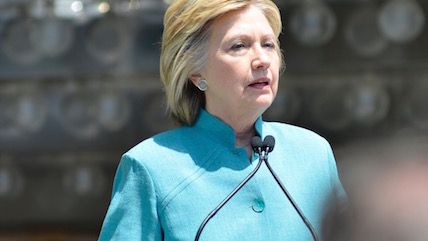Hillary Clinton Proposes Free College Tuition, Won't Explain How to Pay for It
Bernie Sanders likes it. Will taxpayers?


Presumptive Democratic presidential nominee Hillary Clinton is taking a page out of rival Bernie Sanders' playbook, proposing her own plan for "free" college tuition—free for students, that is, but presumably quite costly for someone else.
The new and improved Clinton plan would offer free tuition to students attending public universities whose families make less than $85,000 a year. By 2021, the plan would expand to cover everyone making under $125,000 a year, according to The Wall Street Journal.
Sanders loves the idea. So does Clinton:
"American families are drowning in debt caused by ever-rising college costs and it is imperative that the next president put forward a bold plan to make debt-free college available to all," she said.
It is not clear how many additional families would get free tuition under the modified version compared with the original Clinton plan. The campaign also didn't say how much the new version would cost or how she would pay for it.
There's really only one way to pay for it, of course: pass the cost onto someone else. As with President Obama's community college plan, "free" is an appealing price, to be sure, but nothing is actually free.
I'm also not convinced the plan is as egalitarian as it seems. Keep in mind that wealthy people attend college at much higher rates than poorer people, which means plans to make college cheaper typically subsidize the spending habits of the rich more than the poor. Clinton's plan aims to address that by utilizing a max income figure. But a family living off of $85,000 in New York City, Los Angeles, or Washington, DC might be in much more precarious financial shape than a family living off $85,000 in the suburban Midwest. Does this plan not punish people whose higher incomes are offset by higher living costs?
While it's true that college is much more expensive than it ought to be, the government's continuous efforts to make it more affordable—via subsidized student loans—are an important contributor to the problem. Making college free wouldn't solve the underlying incentive problem: if the government is paying the true cost, universities can raise their prices sky-high without market mechanisms ever kicking in. This cost won't fall on the students, if tuition is free, but it will fall on their families—and the families of people who don't attend college at all—in the form of taxation.
Ultimately, a college education is mostly a benefit for the individual student. Let's let him pay that cost, and expect said cost to be more reasonable the less the government has to do with it.


Show Comments (139)